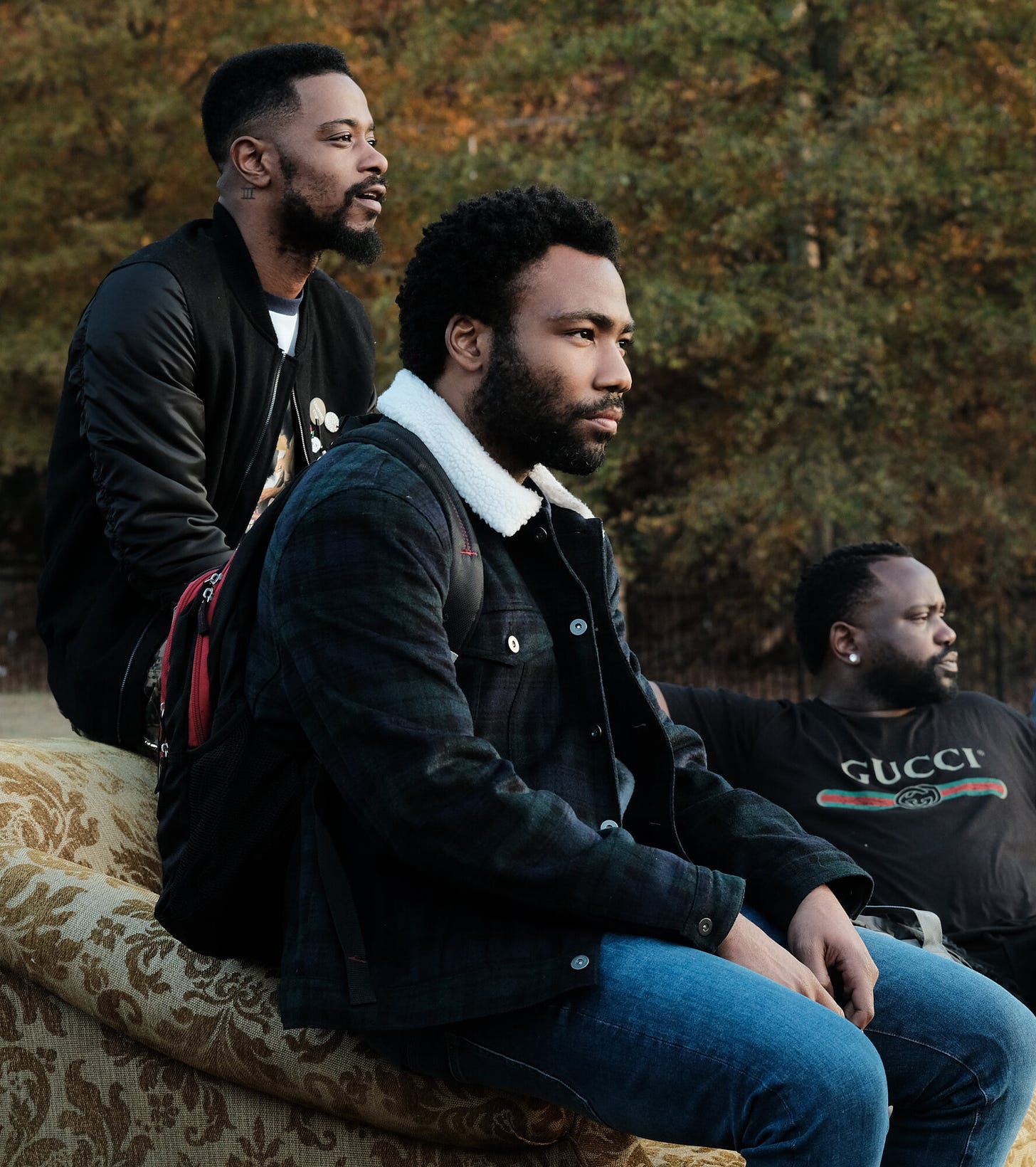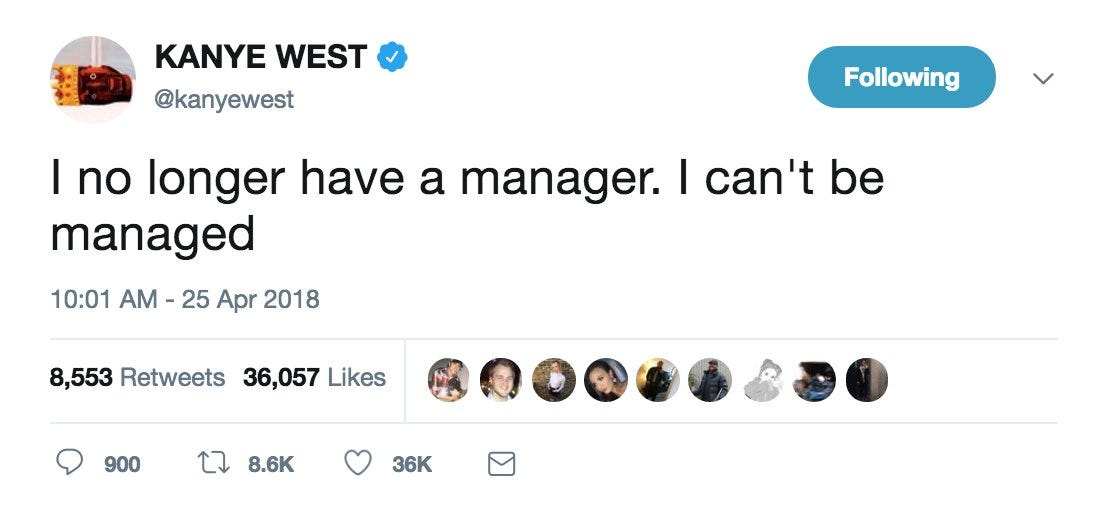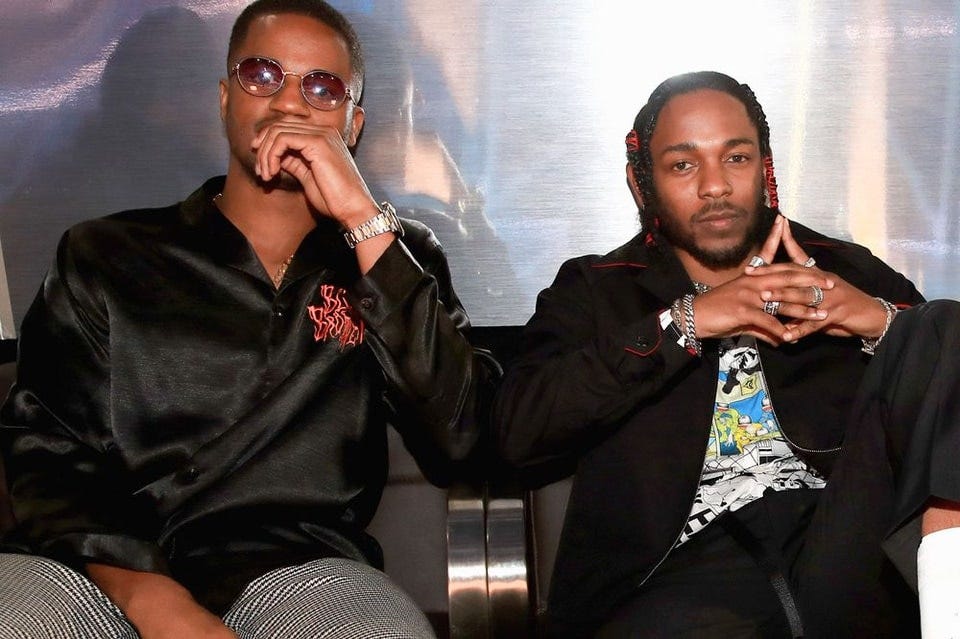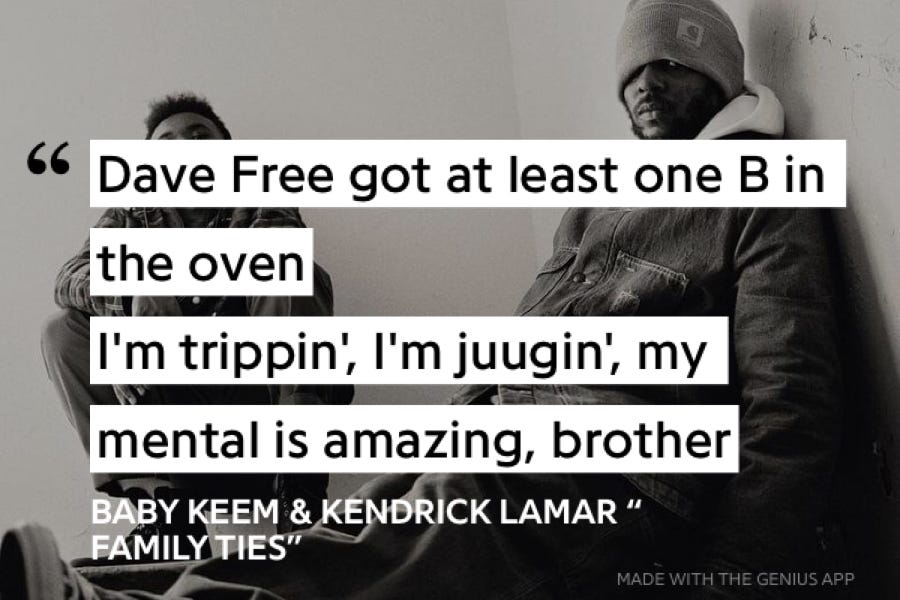LOOKING AT MANAGEMENT DEALS
Reconsidering the Artist Management Business Model
I’m on a wave right now, so I’m going to keep surfing it and see where I end up.
I wrote a 3-part series, called ‘Founders are Artists’, where I wrote a few brainstorms comparing artists to founders, and founders to artists. We can get deep with this; and discuss how everyone is an artist, a founder, and an entrepreneur; it’s just about tapping into it. We can also talk about how the word “entrepreneur” comes from the root word “entreprende” which means to undertake, and that life is the greatest undertaking; it’s just that the world, with all of its rules and structures, tries to limit and beat out our inner artist and entrepreneur.. but that’s not what this article is about.
In this article, I will review the standard artist management agreement; then compare it to corporate and silicon valley business structures - namely equity grants. This article will be brief as many of the same terms covered in my article, ‘Looking at Record Deals,’ will be covered here. When I refer to “artists” in this article, I’m referring to recording artists, writers, producers, and any other creator or “influencers.”
Ok, let’s begin.
I NEED A MANAGER
If you’ve spent any amount of time in music business circles, one thing you’ll commonly hear recording artists, producers, and songwriters say is, “I need a manager!” Usually, what they mean is one of three things:
“I need someone to do the work I don’t want to do,”
“I need someone to make me rich and famous,” or
“I need a glorified assistant”
I’m not trying to be rude; that’s just what it is. What they usually don’t mean is:
“I’ve developed a vision for my life and my career,”
“I understand at, at least at a high level, the music business,”
“My music and career have generated traction, requiring more hands on deck,”
“I’ve done all I can do to push myself, my business, and my career,” and now
“I need someone to help me manage my business which is starting to generate money and attention.”
To be clear, all that is not always necessary.. like I wrote in this article, there are no rules, only principles. Some artists get “managers” before getting to that point. Also, many recording artists, producers, and songwriters are often simply kids and aren’t on that wave length - but that’s another story.
The point is that a manager manages a business, and the mismanagement of expectations between artists and managers often leads to conflict and failure in these business partnerships. There are many stories about artists getting screwed over by managers and labels in the music business, but managers often get the short end of the stick. To maximize your results, you’ll need to figure out the second set before getting a manager, or quickly thereafter. At the end of the day, there’s a clock on the “show,”; but those who understand the “business” will usually reap most of the rewards and be in business the longest.
I once had a conversation with a music executive, and he said, “Many artists think that they’re the stars, but we (executives) are the real stars; we’re the ones who run the business and make the artists.” Artists who want to maximize their potential will learn to think like executives and work productively with them.
MANAGEMENT DEALS
I once listened to an interview where a notable “artist manager” said that the traditional model of artist management was broken and outdated. Several years later, he sold his holding company for $1B.
So what does the traditional management agreement look like? Here are a few highlights:
Services
To start, management agreements will have a clause with general provisions stating that the manager will work in furtherance of the artist’s career and handle a variety of duties, whether it’s overseeing and facilitating the artist’s recording career, facilitating their touring activities, administrating label relations, and managing general marketing and promotional activities. You can get even more specific if the artist has multiple managers, but this clause is often vague and doesn’t require specific results. In fact, it will usually have language that says the manager will “use best efforts,” which basically means they’ll try, but no guarantees.
Commission
The contract will also have provisions for how much the manager will earn from the partnership. Often, if it’s a new artist - the manager may require a retainer; but many times, will not. If it’s a new artist, the manager may use their own money to fund the artist’s career until things take off. Though, this is a good place to say that, as a manager of an artist’s business, it’s not your role to also be the investor - but we’ll get to that. Traditionally, however, managers earn on a commission basis. Depending on how many managers the artist has, and the experience and qualification of the manager, the commission may be anywhere from 10% to 20% for a manager.
On top of the commission, the parties may also negotiate “commissionable income.” These clauses provide, specifically, which types of income the manager earns, and which income streams are excluded. For example, it’s standard to say that if an artist earns $300k from their streaming royalties in a given year, but has to pay the record label, producers, songwriters, and featuring artists $200k out of that $300k, then the manager will only earn their commission from $100k.
That said, you can go further and determine that only income earned from music-related sources (catalog royalties, shows, merchandise, and sponsorships) are commissionable, but that any ventures outside of music are not. When it comes to music-related sources, specifically touring income, you can define commissionable tour income as net of revenue, after expenses such as production, lighting, transportation, vendors, etc., are deducted. It can get detailed, but the point is that shrewd artist negotiators will want to limit commissionable income as much as possible, and negotiators for management will want to expand commissionable income as much as possible.
Term
Next, is the term length of the contract. This can look similar to those in a record deal. You’ll have a fixed term, such as 2 or 3 years, with a mutual option to renew. Though, I usually recommend that the artist and the manager work together, informally, for a while, or include a probationary period of 6 to 9 months, after which the agreement will be in force. Again, a business partnership is like a marriage. Asking someone to marry you when they don’t even know you is crazy.. it makes for good TV, though, I suppose.
Under this provision, a manager will earn their commission during the term of the agreement, often with a provision that they’ll continue to earn on any deals “substantially negotiated” during the term of the agreement.
For example, if you’re a manager and you get your client a 5-year Nike deal, one year before the contract expires and the artist decides to move on, you would continue to earn your commission on the length of that deal. This is often negotiated, term-limited, and coincides with what’s known as a sunset-clause. A sunset clause looks like this:
The manager earns 20% during the Term; and will continue to earn a decreasing percentage after the Term for a period of 4 years.
Year 1 after termination: 20%
Year 2 after termination: 15%
Year 3 after termination: 10%
Year 4 after termination: 5%
Year 5 after termination: 0%
The reasoning, particularly if you’ve been managing the artist for several years, is that you’ve helped build up the artist's value, and should participate even after the contract expires.
MANAGING EQUITY
Alright, let’s get spicy.
Remember when I said artists often don’t know what a manager is or does, and usually really want an assistant they can tell what to do - or who will do the dirty work for them?
Well, the result is that a manager can manage an artist’s business for years and...
..wait, let’s back up.
It’s a misnomer that you “manage artists.”
You manage their business.
Managing a person implies that they’re a child incapable of managing themselves (which is often true in the music business, but not how it should be).
Who am I, though? If you disagree, take it up with Peter Drucker, one of the foremost leaders of business (not music) management; and often called “the founder of modern management.”
He said, “You manage things; you lead people”
Bars.
Back to the point. Because there’s a persistent misalignment, between artists and managers, in the expectation and understanding of management, it can lead to disastrous results. Either managers look to lock up artists for as long as possible and extract as much money as possible, or artists treat managers as disposable commodities, dumping them as soon as a new shiny manager appears. This leads to a short-circuiting of value artists and managers could otherwise have built.
Ok, we’re cooking now.
Everyone wants to get to the place of Lebron James, Maverick Carter, and Rich Paul, who started Springhill Entertainment, now a $725m+ (valued) company, with private equity backers, venture capital investments, and media IP distributed by major networks and studios such as Warner Brothers and HBO; but no one wants to work and partner together, each playing their position to get there.
Lol.
And so this all leads to the last point. Much has been discussed about the Creator Economy and the opportunity for artists to create media companies and leverage their influence, but how do they get there? They don’t get there by themselves, they’ll need partnerships. Partnerships like Kevin Durant and Rich Kleiman.
Managers and Executives need artists who shock and inspire, providing the opportunity to leverage and scale that attention and influence. Artists and Creators need Managers and Executives who can help implement processes and systems, lead the execution of commercial initiatives, and oversee personnel and team members.
When it comes to music, this will require soul searching on the part of artists and managers alike. Both sides will have to ask themselves what they’re in it for, what they want, and who they want going on that journey with them.
Equity
I’ll focus on managers here. As a manager, what rights do you have in the business? If a private equity firm wanted to invest in your artist today and help you scale, what controls do you have? What collateral could they take in the business to guarantee their investment? What future projections could you show them? If you get fired today, what interests would you have in the business providing guarantees to you and the investor that their and your investments are safe? I ask this because investors, like record labels, care just as much - if not more - about management. It’s fine and dandy to have talent; but you can’t do much without effective management, whether self or business.
This is not a new dilemma. For years, managers have wrestled with this, and many have started companies that provide record label and management services to scale their enterprise and provide for the potential of a lucrative exit. Many managers also ask for equity in the artist’s music catalog, negotiating terms that may provide the manager with a percentage of the artist’s royalties, for songs released during the management term. The reasoning is that the manager helped build the value of the artist’s music catalog during that time and should be entitled to a portion of the proceedings. This may be jarring for many artists, but it has precedent in business and the startup world.
As someone who has been a media and technology attorney for several years now, my focus has been on technology transactions, media and entertainment law, and data privacy - but one area that I’ve been increasingly growing in is the area of options and equity.
To set the backdrop, when many companies hire employees, they give them equity or the opportunity to acquire equity in the company, often in the form of options
“Stock options are a form of equity compensation that allows an employee to buy a specific number of shares at a pre-set price. Many startups, private companies, and corporations will include them as part of a compensation plan for prospective employees. Companies often offer stock options as part of your compensation package so you can share in the company’s success.”
The reasoning here is simple, as an employee, particularly an employee in a startup; an enterprise that has not yet found profitability, nor stability, and requires investment and multiple stakeholders; if the company succeeds then those who have participated in building the company should reap the rewards. So whether a company has raised $2 million in a Seed Round or $150m in a Series B or C round, employees will have the opportunity to earn equity; and the earlier you join, the more valuable your equity will be.
So the question is, if the 150th employee to join a company valued (on paper) at $1b can acquire equity in a company then why can’t a manager who is overseeing an artist’s business, which might not even be generating $150k, have equity in the artist’s business, or at least, their catalog?
Tough question, huh?
Now to be clear, it doesn’t have to be this way. There are many ways to slice the cake, different strokes for different folks and all that.. but the irrefutable point is, it makes business sense; whether or not it happens is a different story.
CONCLUSION
In conclusion, not every manager and artist must partner to create a company. Some won’t have that type of bond, some won’t be ready, and there may be opportunities to make money on a term, commission, or “one-off” transactional basis. That said, I believe we will soon see a new wave of artist/executive corporate partnerships that create immense value and redefine business models. This will take aligned expectations, authentic commitment and loyalty, clearly defined roles and obligations, and skilled and experienced advisors.
If you’re looking for inspiration, look to history. Here are examples of managers who have run record labels, in addition to serving as artist managers:
Roc-a-Fella, a record label and media company founded by Jay Z, and managers Damon Dash, and Kareem "Biggs" Burke.
Disturbing the Peace, a record label founded by Ludacris, and managers Chaka Zulu and Jeff Dixon.
PGLang, a music and media company founded by Kendrick Lamar, and manager Dave Free.
Grand Hustle, a record label and media company founded by T.I., and manager Jason Geter.
Lost Kids, LLC, a music company founded by Brent Faiyaz and manager, Ty Baisden.
Stray Society Music, a music company founded by Grip and manager, Isaiah “Tigg” Fofana.
Thanks for reading.








